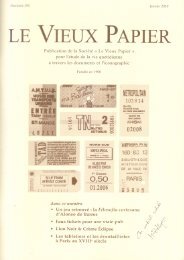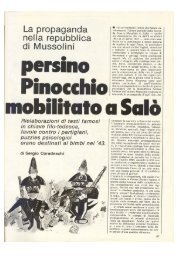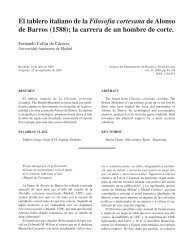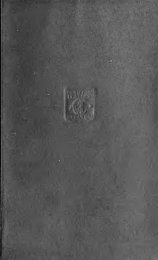Board games from the city of Vijayanagara (Hampi ... - Gioco dell'Oca.
Board games from the city of Vijayanagara (Hampi ... - Gioco dell'Oca.
Board games from the city of Vijayanagara (Hampi ... - Gioco dell'Oca.
Create successful ePaper yourself
Turn your PDF publications into a flip-book with our unique Google optimized e-Paper software.
B OOK R EVIEWS / COMPTES RENDUS / REZENSIONEN 119<br />
Stefan FATSIS,<br />
Word freak: heartbreak, triumph, genius, and obsession in <strong>the</strong> world <strong>of</strong> competitive Scrabble<br />
players. Boston : Houghton Mifflin, 2001. 23.6 x 16.0 cm, xii + 372 pp., b/w diagrams.<br />
ISBN 0-618-01584-1. Price: USD25.00.<br />
Fatsis’s book on <strong>the</strong> tournament Scrabble subculture in America is ostensibly a journalist’s<br />
attempt to come to terms with a modern-day “mind sport,” a thinking person’s<br />
competition that never<strong>the</strong>less embodies <strong>the</strong> sports-like passions carefully selected for <strong>the</strong><br />
subtitle. Fatsis mentions chess <strong>of</strong>ten, as do Scrabble players generally, though his own<br />
traditional mind sport was backgammon and its variants plakato and moultezimi as learned<br />
in summers on his fa<strong>the</strong>r’s ancestral home on <strong>the</strong> Greek island <strong>of</strong> Chios (p. 23). Only<br />
now, Fatsis is a sportswriter for The Wall Street Journal and <strong>the</strong> author <strong>of</strong> a well-received<br />
book on <strong>the</strong> revival <strong>of</strong> minor league baseball in <strong>the</strong> American Midwest. It is while “searching<br />
for a quirky subculture to write about,” he confesses in a press release, that he comes<br />
upon S.L. Price’s article on <strong>the</strong> world <strong>of</strong> tournament Scrabble, “Your Words Against<br />
Mine,” in, <strong>of</strong> all places, an issue <strong>of</strong> Sports Illustrated magazine (December 18, 1995).<br />
But unlike all his o<strong>the</strong>r writing projects, ranging <strong>from</strong> athletic contest negotiations<br />
to minor league baseball management, Scrabble converts Fatsis bit by bit until he alternately<br />
forgets about journalism (p. 307), excuses his enthusiasm by attributing it to journalism<br />
(p. 326), and takes pride in being a Scrabble player (p. 331). He renounces his<br />
image as a pseudo-athletic George Plimpton, <strong>the</strong> iconic journalist who, for <strong>the</strong> sake <strong>of</strong><br />
a story, temporarily became a second-string member <strong>of</strong> a major American football team<br />
(Paper Tiger, 1965), and he begins to see himself as “an athlete who has to work harder<br />
to compensate for limited natural talent” (p. 284).<br />
Thus, what seems at <strong>the</strong> beginning like a firsthand account <strong>of</strong> a subculture starts to<br />
look suspiciously like a memoir, pure and simple. When Fatsis writes about driving out<br />
to Stanfordville, New York to visit <strong>the</strong> white colonial house and tiny archives <strong>of</strong> <strong>the</strong> late<br />
Alfred Butts – <strong>the</strong> uninspired and unemployed architect who was tinkering with Scrabble<br />
precursors by 1933 before developing <strong>the</strong> real thing (pp. 89 ff.) – he is no longer describing<br />
what <strong>the</strong> average or even <strong>the</strong> curious tournament player thinks about <strong>the</strong> legendary<br />
Butts, but trying to flesh out his book with privileged information. Some <strong>of</strong> <strong>the</strong> scholarly<br />
digressions on <strong>the</strong> history <strong>of</strong> <strong>games</strong> and dictionaries were likewise prompted by<br />
Fatsis’s own more immediate lugubrious states <strong>of</strong> defeat at <strong>the</strong> Scrabble table (p 267). Ten<br />
<strong>of</strong> <strong>the</strong> twenty-two chapters (plus epilogue), including <strong>the</strong> last five, are titled with a simple<br />
four-digit number designating Fatsis’s rating at those stages in <strong>the</strong> story. The book is<br />
primarily an account <strong>of</strong> <strong>the</strong> author’s climb to <strong>the</strong> level <strong>of</strong> “expert,” Fatsis is himself <strong>the</strong><br />
“word freak” (singular) <strong>of</strong> <strong>the</strong> book’s title, and any interpretation <strong>of</strong> <strong>the</strong> game will have<br />
to be abstracted <strong>from</strong> that three-dimensional though articulate life.<br />
The reading is <strong>the</strong>refore exciting but a bit frustrating. Word Freak is meant as a sports<br />
autobiography and is unburdened by endnotes or index, though <strong>the</strong> author thoughtfully<br />
provides a beginning “note” containing <strong>the</strong> basic rules <strong>of</strong> <strong>the</strong> game and an explanation<br />
<strong>of</strong> <strong>the</strong> conventions for notations used throughout <strong>the</strong> book, especially <strong>the</strong> handful<br />
<strong>of</strong> diagrams <strong>of</strong> key stages in some <strong>of</strong> <strong>the</strong> more illustrative <strong>games</strong>. Also included are three







